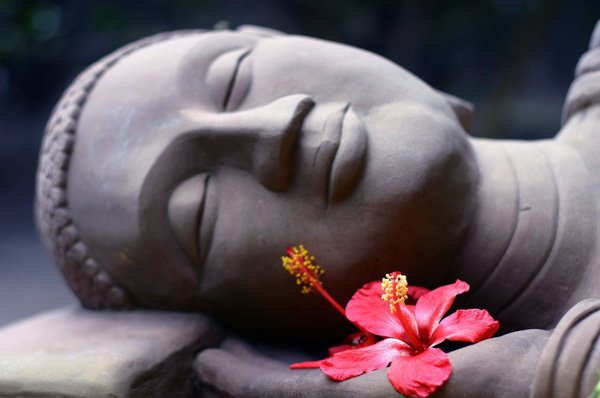Daily Zen
Love, Buddhism, and Detachment
 A joyful discussion at breakfast this morning.
A joyful discussion at breakfast this morning.
Me “ Every time I see my cat going by , I stop dead. Like a sort of ecstatic trance. Time stands still, as a smile instantly rises to my lips. Is it serious, doctor?”
A practitioner gently teases me – “Kankyoooo … What about detachment then?…;-) “
A little later on the same day, whether by coincidence or synchronicity perhaps, a young woman sends me an email with the following question. “ Kankyo, how do you manage to love without being attached? Or how do you work towards that? …”
It looks like the theme of the day. Hence this little note. Perhaps if you read it, it can give you something to chew over , something to think about.
Also, even if there is a lot to say about our relationships with animals – I have chosen here to talk about love in the sense of loving relationships, and here are some examples to support this.
The Passion of Love and the Passion of Mysticism: The Buddhist Point of View.
“Love so much you lose your mind. Love so much that there can be no words.” You doubtless know these verses of the French poet Louis Aragon , brilliantly describing the condition of passionate love.
 At the beginning of an affair, when our heart feels like it will beat out of our chest, when we analyse each word of the text we’ve received from the loved one ( and we agonise over each word of our response.) When we spend hours deciding what to wear. When we swoon at the sight of two cooing pigeons etc… A sacred time – in fact – where we curiously resemble a sunflower, totally turned in the direction of our new Sun. At that moment … hmmm what can I say … there’s not really a lot of difference between us and a drug addict! The outside world is only passingly interesting, conversations bore us unless they are about the Chosen One and our activities become meaningless. A state of passion, studied by scientists and poets of every variety. A state of extreme creativity, where time stands still. A state that it is a good idea to come out of after some months, for fear of being completely lost.
At the beginning of an affair, when our heart feels like it will beat out of our chest, when we analyse each word of the text we’ve received from the loved one ( and we agonise over each word of our response.) When we spend hours deciding what to wear. When we swoon at the sight of two cooing pigeons etc… A sacred time – in fact – where we curiously resemble a sunflower, totally turned in the direction of our new Sun. At that moment … hmmm what can I say … there’s not really a lot of difference between us and a drug addict! The outside world is only passingly interesting, conversations bore us unless they are about the Chosen One and our activities become meaningless. A state of passion, studied by scientists and poets of every variety. A state of extreme creativity, where time stands still. A state that it is a good idea to come out of after some months, for fear of being completely lost.
In the period of passionate love, we are looking for union. It can seem like a mystical quest. But the difference with the latter is that the passionate lover has a enormous cosmic thirst to be in the presence of the other person. A thirst which is well described in buddhism as the source of all human suffering. This thirst, turned outwards, takes the person outwards, like a whirlwind. Mystical passion – or the spiritual quest – turns us inwards towards our goal, the first step of which is returning to oneself, with no magic tricks.
“Why Love? Why do I love you?”
A huge question. There are many answers and a long road to travel for a wise answer, such as “ I love you because you’re you” ( not “ I love you because you bring me whatever.”)
Before reaching this love, we have a whole bunch of “love – drugs” or “compensation loves.” Encounters which move us on, often painfully.
Around 25 years of age, I had a sort of Pygmalion love affair, where I was completely taken over by a man, always studying his desires and painfully aware that little by little I was losing meaning in my own life. 10 months hanging from his lips, before finding the strength to disengage. 10 months of looking for him to validate my worth, before realising I needed to find it in myself. 10 months of a rich apprenticeship in life, the foundation really of what was to follow.
I didn’t actually love this man, and the thought devastates me today. I was expecting him to love me. I called him a hundred times a day, but he didn’t really exist. Also, advancing along the spiritual path, it’s a good idea to ask this question: what is this love that I am actually living or that I wish to live? Why am I with my partner? What place does the other person really have in our relationship? Am I capable of seeing him or her live, with interest and tenderness.
Love and free the other person.
 One of the buddhist precepts which we receive when we enter the Way of the Buddha, is formulated as follows “ Do not covet.” Do not let the other person be there just to satisfy our desire or satisfy a need.
One of the buddhist precepts which we receive when we enter the Way of the Buddha, is formulated as follows “ Do not covet.” Do not let the other person be there just to satisfy our desire or satisfy a need.
So how can we love with “detachment?” Well, in the first place, by studying ourself enough- through meditation – so that we see this need, accept it and let it just evaporate. Not once and for all ( that would be too easy!) but each time we meditate.
= something is missing for me. There is an emptiness inside. I have a feeling of loss.. OK. I accept that and open myself to that emotion, without fighting it.
In this way , we take responsibility for ourself. And we start to free the other from our expectations, to give them back their place in the relationship : a different place, astonishing though it may be, where we can discover and love them as they are.
